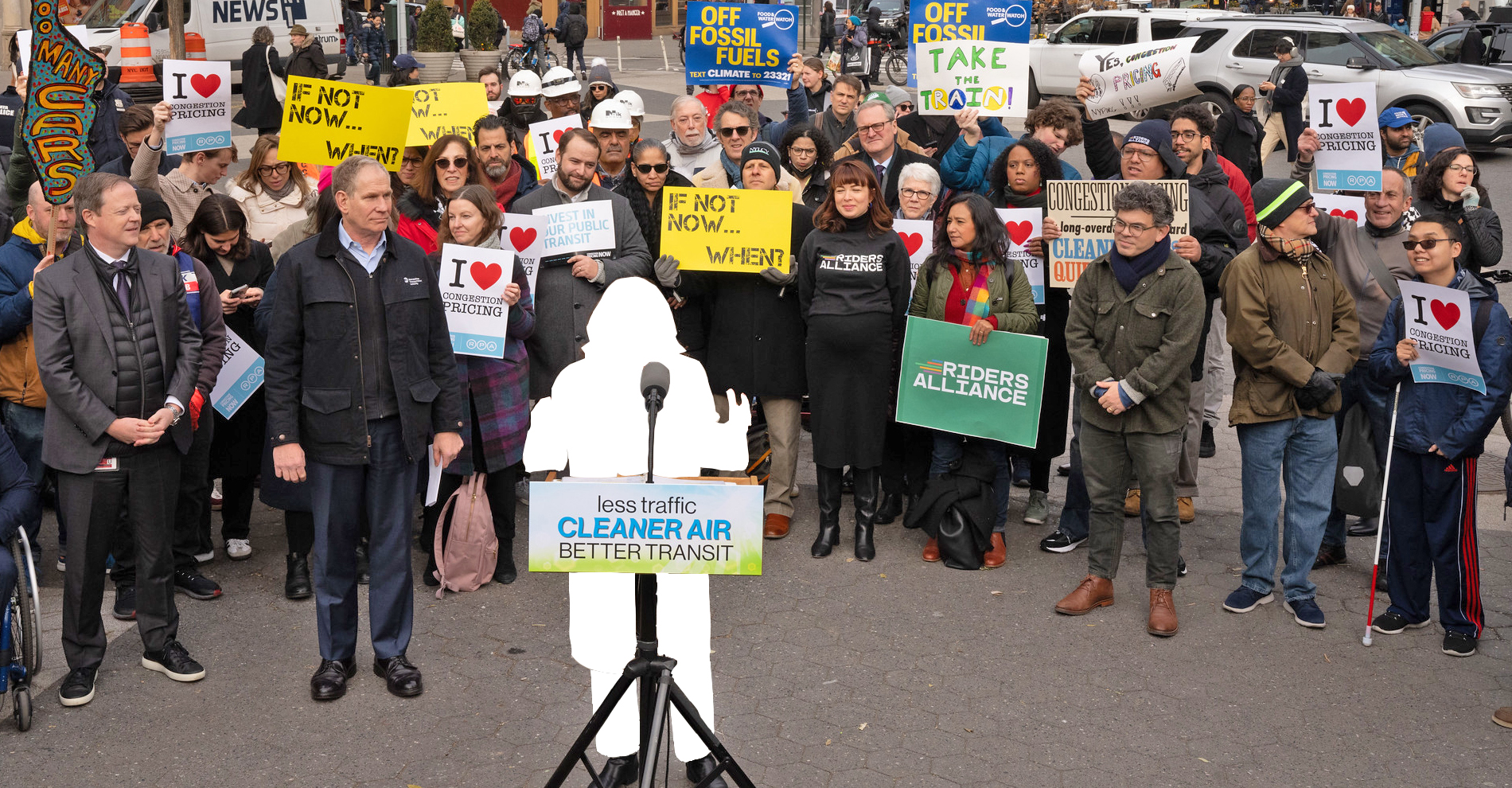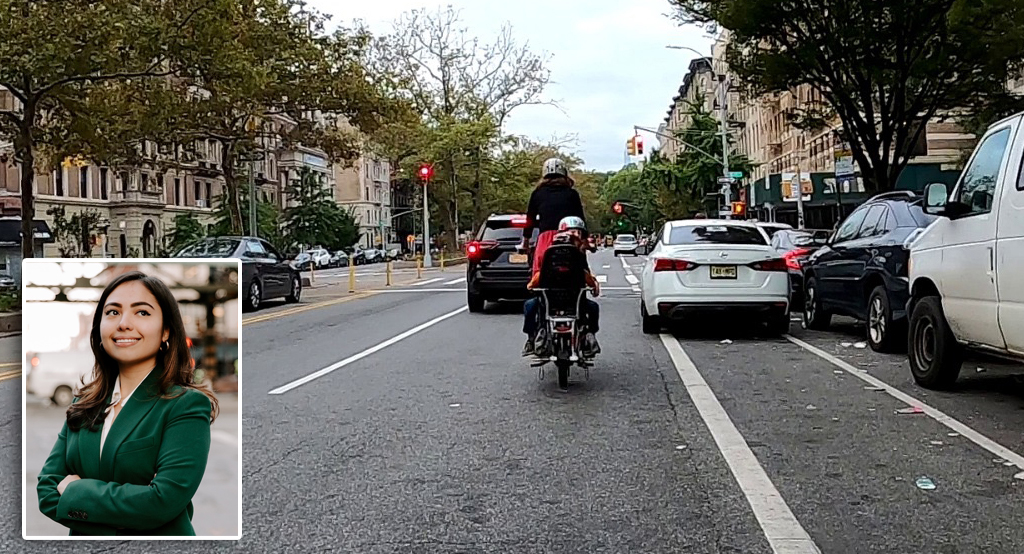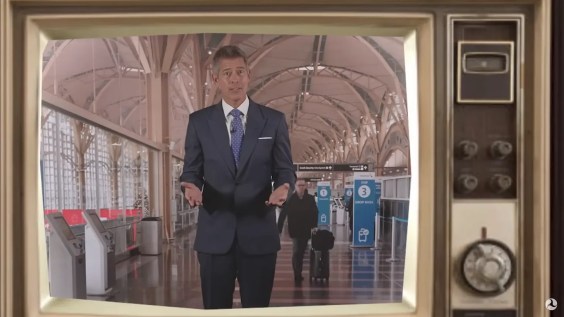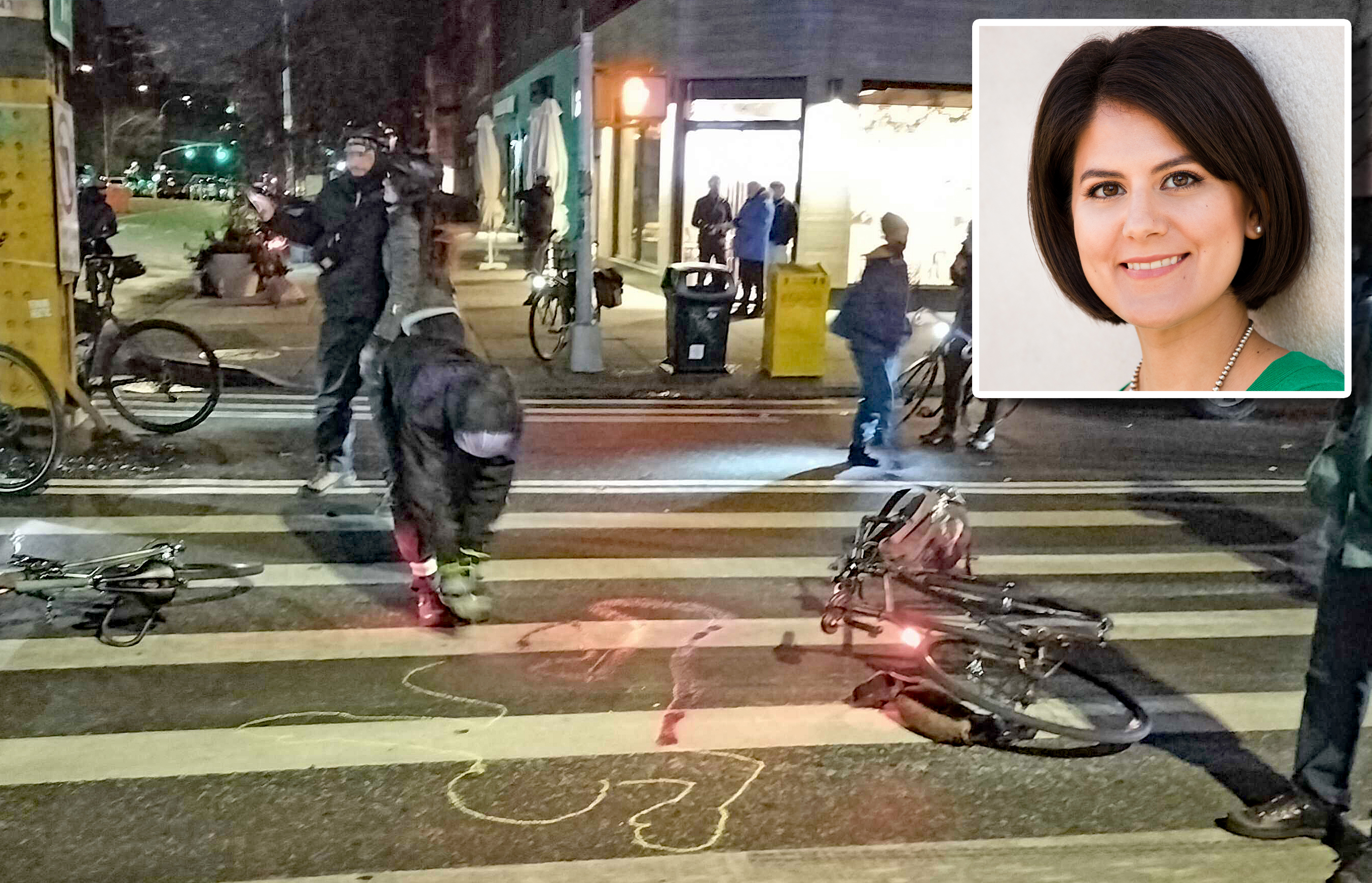Since Gov. Hochul's June 6 announcement that she had killed congestion pricing, Streetsblog reporters have posted more than 30 stories about the crisis from New York and Albany. But that level of intensity also requires support from our readers. Click here if you can help fund more reporting.
The editors
Congestion Kathy’s last-minute pause of congestion pricing has divided the working class and the placard class.
Gov. Hochul's flip-flop was not only noteworthy in how it betrayed years of her own bold pronouncements and advocacy, but it also threw under the bus a coalition of congestion pricing supporters so broad that it included strange bedfellows such as the generally conservative Real Estate Board of New York and tenant organizations, the pro-business Partnership for New York City and the left-of-left-of-center Democratic Socialists, the construction trades and environmental groups, non-partisan conservation groups like New York League of Conservation Voters and environmental justice organizations like EarthJustice.
“We're seeing more support than we ever have,” said Danny Pearlstein of Riders Alliance. “The obvious missing pieces are highly self-interested, like public employee unions that represent people with parking placards.”
It's all about the placards
How can Hochul, once something of a transit-evangelist, have had such a profound change of heart?
It’s a tale as old as time for the most congested city in the country. Politicians looking for the support of municipal unions give them a perk in the form of a placard, or a golden ticket to free parking.
Former Mayor Bill de Blasio bestowed this privilege on the teacher’s union in 2017, when he issued tens of thousands of placards. The United Federation of Teachers later joined with Staten Island Borough President to sue over congestion pricing. Only a political naïf would be surprised.
This costly cycle creates a voting bloc that clutches its driving privileges tightly, and politicians want to keep the support of these labor groups. Of course, placard-holding municipal employees don’t have to drive to work, they choose to, largely because their placards serve as an incentive.
“We all respond to incentives. What a placard does is it reduces the cost of driving to work, and congestion pricing raises it,” said Pearlstein.
The placard "system" is full of abuse (which explains why there are multiple Twitter accounts devoted to cataloguing it). When Streetsblog surveyed lower Manhattan for its first-ever Placard Census, the results revealed a vast web of outright fakes, real placards that were expired, and valid placards parked illegally — adding not just to the danger of the already-congested downtown, but to the impossibility of revoking such a privilege.
Who stands with Congestion Kathy?
So who is supporting the governor? Who is telling her "hard-working everyday New Yorkers" will be punished by a $15 toll to drive into transit-rich Manhattan at the busiest part of the day?
The United Federation of Teachers, The Municipal Labor Committee, The Public Employees Federation, all representing placard-using employees, have supported Hochul’s decision, claiming that their members can’t take the multitude of transit options available to them.
“The governor said it all right — it’s about standing up for the hard working men and women of the city of New York. They drive into work because they have no choice,” Harry Nespoli, the chairman of the Municipal Labor Committee, told Streetsblog.
And drive they can — though now a tiny portion of the cost of their driving would be recouped and invested in the very transit that they say they can't currently take. Hochul herself admitted that this group of drivers is nowhere near the majority of New Yorkers. In fact, only 4 percent of Central Business District workers from the outer boroughs commute to their Manhattan jobs in a car, according to the Community Service Society of New York, which represents New Yorkers most impacted by poverty.
The governor knows this; last week, she even referred to driving to work as a “luxury” in her latest ham-fisted attempt to defend her decision to put the placard class above the working class.
“[Teachers, hotel workers, and police officers] want the luxury of having their own vehicle,” said a press conference. Put aside the use of the word "luxury" to describe a behavior that should not be taxed, Hochul had previously declared that one of the goals of congestion pricing was to bring in new riders thanks to a better-funded MTA.
“This is a viable funding source that is going to help us sustain the level of service and even enhance it,” said Hochul last year. “[Car commuters] are just so conditioned to driving. We’re going to help them see the light.”
Or not.
The courage to lead
The myth that poor, ordinary, working-class people need cars to drive to work isn’t unique to New York City. When Stockholm introduced congestion pricing in the 2000s, some Swedes thought it would be unfair to low-income workers who "needed" to drive to their jobs.
"I always found it funny who makes the argument that working people 'need' a car," Jörgen Andersson, a systems administrator at the Swedish Transport Agency, told Streetsblog. "It's always a middle-aged white man saying it, because he wants to protect his right to use an SUV in the city. So, I mean, that's quite silly."
Had Hochul only stayed the course, she might have enjoyed support after implementation, as Stockholm did, as skeptics turned to supporters after seeing how trips into their central business district plummeted, air quality improved, and crashes declined.
At one time, of course, Hochul knew that the vocal minority was just that — a minority that needed to be overruled for the greater good.
“From time to time, leaders are called upon to envision a better future, be bold in the implementation and execution, and be undaunted by the opposition,” the governor said.
Too bad she didn’t listen to her own advice.
Toeing the line
Some of the groups that are now rallying behind Hochul’s 180 to save themselves $15 supported congestion pricing years ago when they were part of the “Fix Our Transit” Coalition, which included the New York Hotel and Motel Trades Council and SEIU 32BJ.
Not anymore.
“Since our members rely heavily on public transportation, 32BJ not only supports funding the MTA but also the environmental goals motivating congestion pricing,” 32BJ President Manny Pastreich said in a statement. "However, years have passed since it was initially approved and the challenges we face have shifted. We support Gov. Hochul's pause on congestion pricing."
Pastreich represents a group attempting to straddle both sides, touting support for congestion pricing’s environmental goals and potential for infrastructure improvement while also supporting the pause. Advocates say this view is counterproductive and an attempt to wade carefully through a political crisis.
“Once a plan has been set in motion, the best outcome for everyone involved is to continue that plan,” Elizabeth Moran, a policy advocate for Earthjustice, told Streetsblog.






